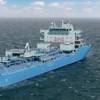Whether your philosophy is "less is more" or "bigger is better", Thales (pronounced "TAL-less") Navigation delivers both.
Thales Navigation emanates from parent company Thales, a $10 billion Goliath that has astutely purchased a number of marine electronic brand name product companies, such as GPS maker Magellan and its well-known Ashtech brand, in recent years, helping to enlarge an already expansive company. It recently consolidated all of its professional GPS products, including the Ashtech brand, under the Thales Navigation brand name, a re-branding which is designed to unify Thales Navigation's professional product offering and help streamline the company's marketing communications efforts.
Maritime Reporter & Engineering News recently caught up with Neil Vancans, general manager of Thales Navigation's Professional Products Business Unit, to discuss the company's current strategy and future performance. The move towards sole system supplier in nearly every corner of the manufacturing world has resulted in a decade-long corporate consolidation that has resulted in fewer, larger companies. While bigger does not automatically deliver better, the trend towards fewer, larger companies allows well-run companies to leverage its resources for the strength of all.
"We are interested in selling more than just boxes … we are interested in packaging these boxes into an engineered solution," Vancans said. "I don't think there is a form of communication that we don't have access to for integration into a package for use onboard ships. We have products that are building blocks, and the completed solutions." Noting the financial resources of the company and its effect on bringing solutions to market, Vancans said "Thales is a $10 billion company, and there is a huge amount of research across a number of different areas, from flight to navy."
While Thales offers the breadth and resources of a large corporate entity, its approach to entering a market, as it hopes to do in the U.S. this year, is decidedly 'mom and pop.' He sees the North American market as one that is in need of a single source solution provider, and admits that the company likes to "get our hands dirty, get onboard vessels, evaluate needs and provide finished solutions."
And while it may seem that further consolidation is unnecessary, Vancans differs. "It is no secret. Smart companies are always looking at all options for growth and to continue to offer better solutions for their customers. We will continue to watch companies as they become available for acquistion or fit the portfolio that we are looking to move into. We will continue to use our financial muscle, and the Thales name."
Currently, the marine business accounts for about 20 percent of Thales Navigation, a figure which should grow to about 30 percent in the next 12 to 15 months, as Vancans sees the marine market as growing more quickly than other niches. Thales acquired Magellan Corporation in 2001, along with its Ashtech brand, and combined it with France-based Thales Navigation, S.A. to form Thales Navigation. Since the acquisition, the company has reached a number of strategic milestones — all rooted in its continuing achievement as a global professional GPS leader. The company restructured its organization to create two distinct business units, one for professional products and one for consumer products, and appointed Vancans as general manager of the Professional Products Business Unit.
Vancans most recently served at Leica both as member of the management board, responsible for Leica's business areas, and as president of Leica Geosystems GPS Business Area. Leica's GPS business grew from $30 million to $90 million under his leadership. The strategic growth of GPS was a major contributor to Leica's highly successful IPO in July 2000. As a native of the U.K. who has lived in the U.S. for six years, Vancans brings a unique and worldwide perspective of the professional GPS business. His experience in leading multi-cultural teams in diverse locations across two continents also made Vancans the perfect choice for Thales Navigation, which has 15 locations across nine countries in North America, Europe, Asia, and Africa.
Dawning of the Age
When discussing new business opportunities such as the U.S., Vancans is quick to clarify that he sees robust growth in the marine surveying, offshore and dredging ends of the market. Thales Navigation's new Aquarius positioning solution is designed to help the company establish market share quickly.
With Thales' dual-frequency Long Range Kinematic (LRK) processing technology, the standard for outstanding performance, users get fast real-time centimeter-level positioning and a fully operational radio link up to 40 km. With LRK, surveyors are able to work at greater distances than they can with conventional real-time kinematic (RTK). Aquarius is also available in a single-frequency version featuring Thales' Kinematic Applications in Real Time (KART) technique.
Users can take advantage of the high performance of the Thales-designed UHF link ("U-Link"), and they also use an HF/MF link ("HM-Link") providing full compatibility with existing networks, such as HF or IALA radio beacons.
Aquarius offers a broad range of features, including a floating power input, a sealed ultra-resistant case and essential interfacing capabilities. The system offers flexibility with its five input/output ports, the TRM100 navigation and control terminal and ConfigPack software.
Aquarius has the built-in potential for additional expansion, depending on the chosen model: It can be upgraded from singe to dual frequency, or even to Aquarius2, which offers a combination of accurate heading and positioning. Aquarius is backward compatible with Thales Navigation's Ashtech 5000 series. Thales Navigation's new Aquarius2 marine survey system combines precise heading capabilities with accurate positioning, Aquarius2 adds a second set of GPS/GNSS channels to allow users to reach dual-frequency heading accuracy of 0.01° or single-frequency accuracy of 0.1° (2 m baseline), depending on the configuration used. The accuracy is made possible by Thales Navigation's exclusive Gyrosky technology.
Sponsored Content
Innovative Hull Maintenance: Profitable & Green

Subscribe for
Maritime Reporter E-News
Maritime Reporter E-News is the maritime industry's largest circulation and most authoritative ENews Service, delivered to your Email five times per week












